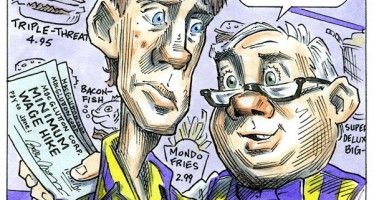L.A. Times and Prop. 32: Will it repeat its stunning stand on Prop. 75?
Sept. 27, 2012
By Chris Reed
Nexis and the L.A. Times’ website show the editorial page of California’s biggest newspaper has yet to come out for or against Proposition 32, the measure whose primary goal is preventing automatic deduction of union dues from public employee paychecks for political purposes. Michael Hiltzik, the loud lefty whom the Times pretends is a business columnist, has trashed 32. But not the Times’ editorial page.
What’s up with that? The Sacramento media-political establishment says the prop is the devil. Why would the Times not get on board?
Maybe because in 2005, in a baffling, uncharacteristic spasm of honesty about how California politics work, the Times endorsed (!!!!) Prop. 75, Prop. 32’s clear historical predecessor. Highlights:
“We support this more narrowly tailored initiative primarily as a means of lessening the power of public employee unions in Sacramento, but also as a way of reinforcing the right of union members to insist that their hard-earned income not be diverted to political causes they don’t endorse.
“The U.S. Supreme Court has ruled that union members cannot be forced to finance political activity, and Proposition 75 merely requires that public employee unions get written consent from their members before their dues and fees are used for political purposes. Currently, union members must request specifically that their dues not be spent on politics, and there is some question about how realistic a choice this is in some unions. Shifting the burden to the union to gain the consent of a member — as Washington, Utah and other states now require — does not seem onerous, and may even encourage greater accountability on the part of union leadership.
“Proposition 75 opponents argue that this is unfair because there is no similar move to curtail the discretion of business lobbyists to invest shareholder resources in politics. But the analogy is flawed, given that this initiative applies only to public employee unions. It’s not private businesses that sit across the negotiating table from public employee unions; it’s the taxpayers and their elected representatives, acting as stewards of the public interest.
“If this notion sounds almost quaint, it is, because it has become so divorced from reality. At many levels of government, public employee unions, aided by their political war chests, have gained control over both sides of the negotiating process. When public employee unions wield the type of influence they now do in California, too much governing becomes an exercise in self-dealing.
“… Proposition 75 constitutes an important step in the right direction.”
Wow. The bolding is mine. The Times wrote that in 2005, before the Bell scandal, before the pension tsunami began to hit, before unions, John Burton and the state Democratic Party supported letting epileptic kids die unless their medication was administered by union nurses.
The 2012 version of Prop. 75 has some slick aspects that may be cited by the Times as a reason to oppose Prop.32. But if the paper’s editorial board thought union power in California was out of control in 2005, how can it not conclude that’s still the case in 2012?
We shall see!
Related Articles
Minimum wage jumps to $9 an hour
Here’s what the minimum wage does: it destroys tens of thousands of jobs to increase the pay of tens of
CA pension reform opponents squawking about election results
June 5, 2012 By Brian Calle Voters in San Diego and San Jose, recognizing the budget havoc wreaked by public
LAO: State’s reserves could weather mild recession, face “considerable uncertainty”
Although it faces “considerable uncertainty,” the state’s budget could survive a mild recession for four years without a tax hike or




